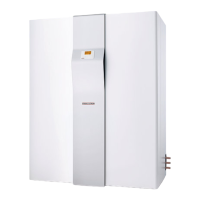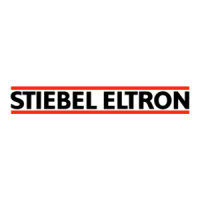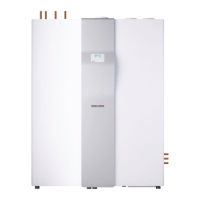Do you have a question about the STIEBEL ELTRON LWZ 170 E plus and is the answer not in the manual?
Provides general information about the appliance and its documentation.
Details safety instructions, types of risks, and keywords for hazard identification.
Explains symbols used in the documentation for general information.
Explains how to interpret standardized output data according to EN 13141-7.
Specifies that measurements are in millimeters unless otherwise stated.
Outlines safety precautions and general safety instructions for the appliance.
Describes the appliance's components and how it functions.
Explains the automatic bypass damper function for regulating fresh air intake.
Details the frost protection unit and preheater coil for preventing freezing.
Introduces the appliance's settings and user interface for adjustments.
Refers to separate instructions for operating the remote control.
Describes the appliance's display, control keys, and menu navigation.
Explains how to turn the appliance on via a standard socket or software.
Details how to switch the appliance off via software or by interrupting power.
Describes the information displayed in standard mode and its components.
Explains the fan symbols and their meaning for different fan stages.
Describes how the air flow rate is displayed and what it indicates.
Explains message texts that may appear in standard mode, prioritizing 'FILTER'.
Outlines user maintenance tasks, focusing on filter cleaning and replacement.
Lists available replacement filter types, their product design, and part numbers.
Provides instructions on cleaning filters and the importance of never operating without them.
Step-by-step guide on how to switch off, clean/replace filters, and reset the filter indicator.
Provides a guide to identifying and resolving common appliance faults.
Explains how fault symbols and numbers are displayed and the appliance's behaviour during faults.
Details non-blocking and blocking fault codes, their causes, and recommended measures.
Emphasizes that only qualified contractors should perform installation and maintenance.
States that trouble-free function relies on using original accessories and spare parts.
Advises observing applicable national and regional regulations and instructions.
Discusses precautions for operating the appliance with combustion equipment.
Notes that no additional precautions are generally needed with room-sealed combustion equipment.
Warns about safety equipment requirements when operating with open flue combustion equipment.
Lists the standard delivery items included with the appliance.
Lists the standard delivery items included with the appliance.
Mentions hardwired remote controls as required accessories for airflow control.
Suggests obtaining ventilation pipes and valves as further accessories.
Outlines preparations before installation, including site selection and transport.
Specifies requirements for the installation site, including wall type and environmental conditions.
Advises on transporting the appliance safely in its original packaging.
Begins the section on installing the appliance.
Provides instructions on how to mount the appliance using the supplied bracket set.
Details how to connect the condensate drain, including siphon creation and pipe routing.
Provides guidance on connecting air ducts, including external walls, silencers, and insulation.
Covers electrical connection and power supply requirements, including safety warnings.
Explains the X1 connection for eBUS or OpenTherm communication protocols.
Describes the X2 connection for stage switches and its suitability for low voltage.
Details the X14 connection for an external reheater coil and its associated parameter settings.
Details the terminal strip X15 and its connections for switching inputs and sensors.
Explains how to set operating modes using external switching contacts via X15-1 and X15-2.
Describes connecting safety equipment for stove/fireplace operation via X15 or power interruption.
Illustrates the electrical wiring diagram of the appliance, showing connections for various components.
Covers the initial startup and commissioning process for the appliance.
Details the initial startup procedures, including setting the air flow rate.
Explains how air flow rates are determined by duct pressure and filter resistance.
Provides guidance on shutting down the appliance for longer periods.
Outlines checks to perform before recommissioning the appliance.
Explains how to access and navigate the settings menu to change parameters.
Guides the user through selecting and setting parameters in the appliance's menu.
Details the process of changing parameter values using the appliance's interface.
Explains how to discard changes to a parameter value without saving.
Describes how to save a changed parameter value by confirming it.
Provides a comprehensive list of adjustable parameters, their descriptions, and settings.
Details the extract air fan mode settings based on switching input 1.
Describes the selection options for switching input 2.
Specifies the minimum voltage setting for switching input 2.
Specifies the maximum voltage setting for switching input 2.
Outlines the conditions for switching input 2.
Details the supply air fan mode settings based on switching input 2.
Details the extract air fan mode settings based on switching input 2.
Explains the setting for the geothermal heat exchanger functionality.
Specifies the minimum temperature for geothermal heat exchanger operation.
Specifies the maximum temperature for geothermal heat exchanger operation.
Explains how to view appliance status and values without changing settings.
Describes accessing the service menu to view fault messages and blocked settings.
Details how to reset all changed settings back to the original factory defaults.
Covers maintenance tasks to be performed by a qualified contractor, including heat exchanger and fan cleaning.
Critical warning about replacing power cables only by qualified personnel.
Step-by-step instructions for cleaning the fans, including handling pressure compensation weights.
Advises on the regular checking and cleaning of air ducts for optimal performance.
Provides a guide to identifying and resolving common appliance faults.
Addresses issues related to incorrect microswitch settings on the control PCB.
Explains the importance of pressure hose connections for correct fan control.
Presents the technical specifications of the appliance.
Details the physical dimensions and connection points of the appliance.
Specifies the minimum required clearances around the appliance for installation.
Provides a table with key technical data, including electrical, dimensional, and performance values.
Illustrates the electrical wiring diagram of the appliance, showing connections for various components.
Presents sound data for different ventilation rates and duct types.
Displays fan diagrams showing air flow rate versus static pressure and power consumption.
Outlines the conditions and limitations of the product guarantee.
Advises on proper disposal of materials in accordance with national regulations.
| Brand | STIEBEL ELTRON |
|---|---|
| Model | LWZ 170 E plus |
| Category | Fan |
| Language | English |








